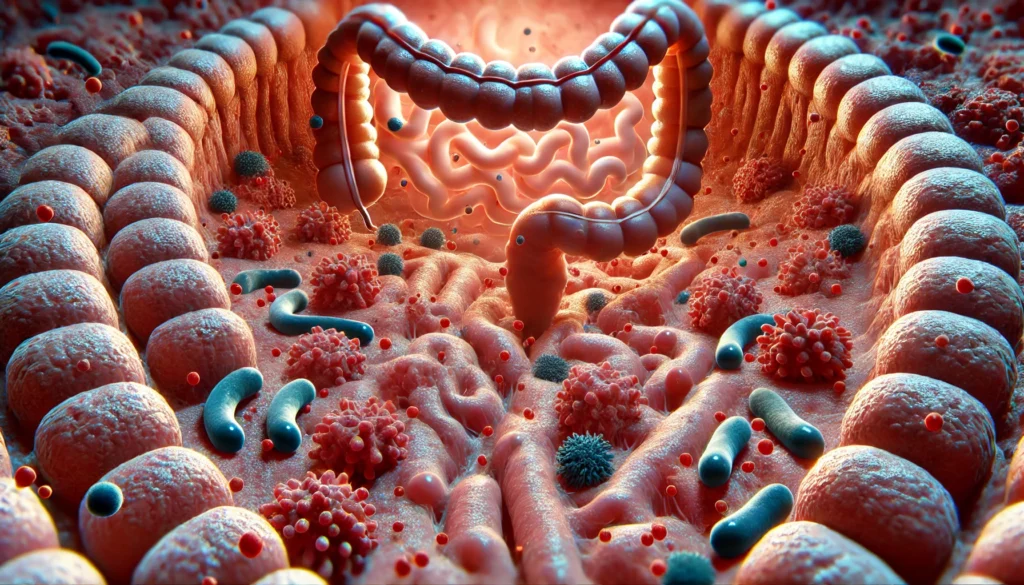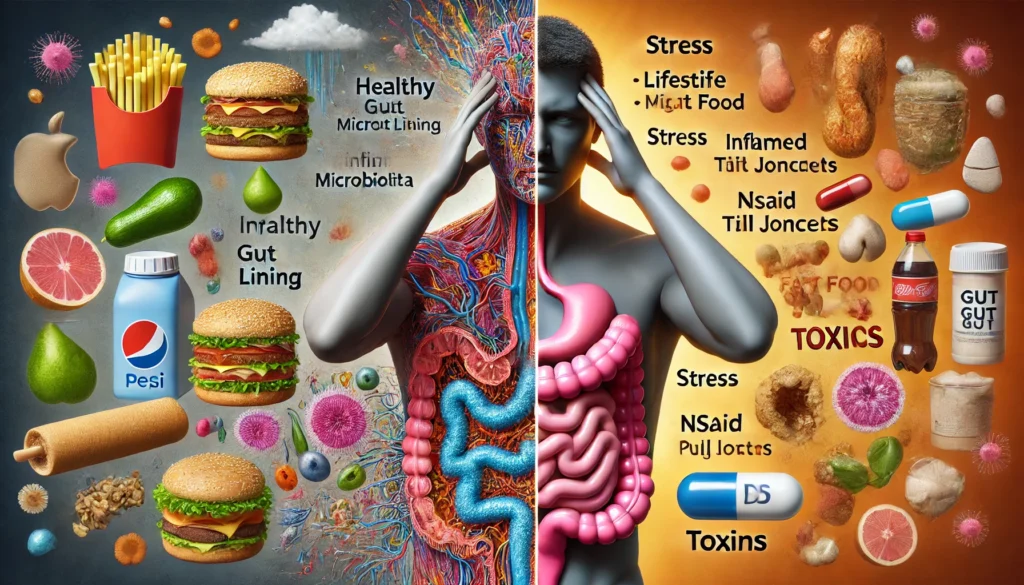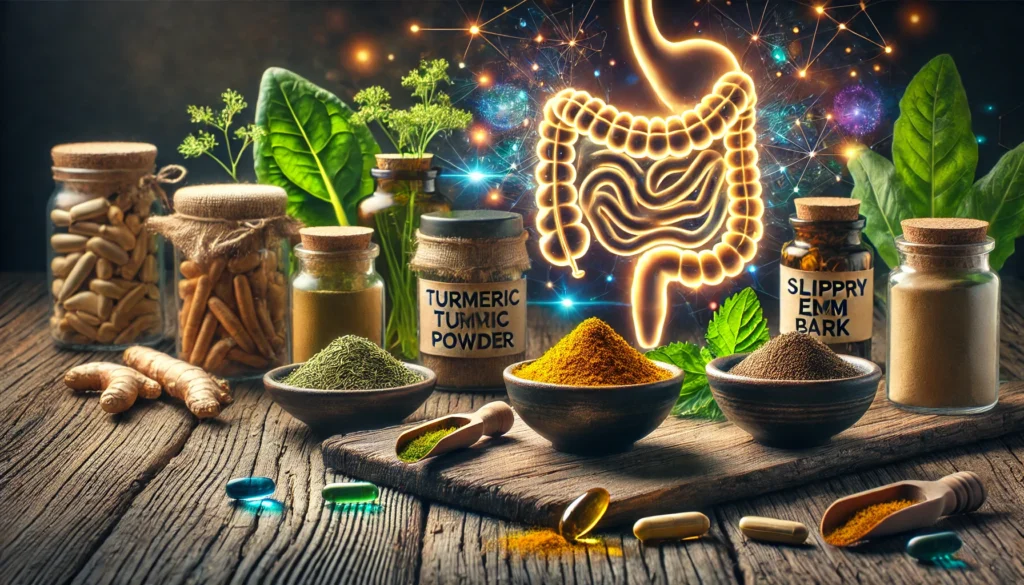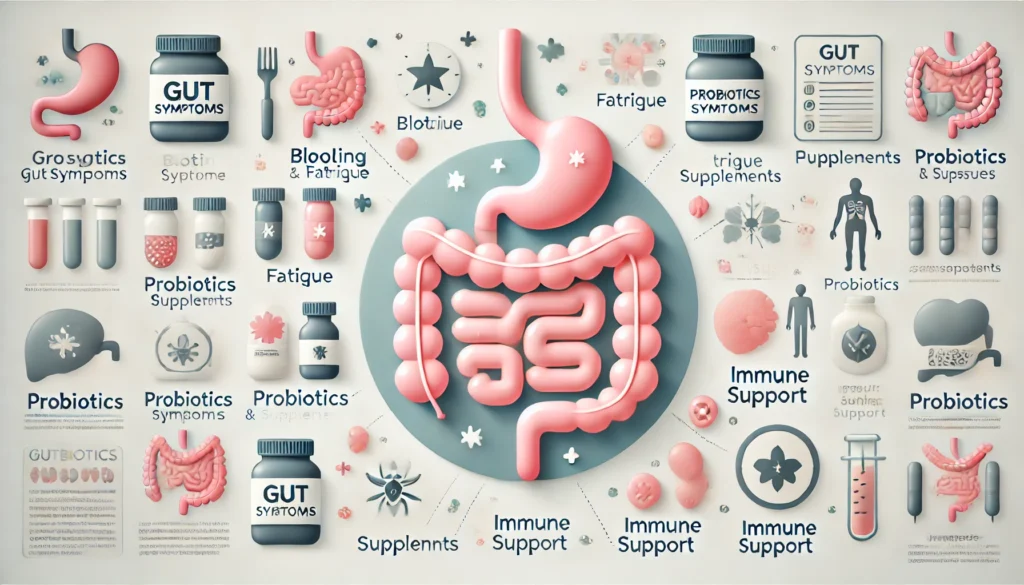Introduction
In recent years, interest in gut health has exploded—and for good reason. The gastrointestinal tract is no longer viewed simply as a system for digesting food. Instead, it’s recognized as a complex, interconnected ecosystem deeply tied to immunity, mood, metabolism, and even longevity. When the gut lining becomes damaged or the microbiome disrupted, the ripple effects can be felt throughout the body. This makes the search for effective gut healing strategies a priority for many facing chronic inflammation, autoimmune conditions, or persistent gastrointestinal discomfort.
You may also like: The Science of Gut Repair: How to Heal Leaky Gut Syndrome Naturally with a Proven Gut Healing Diet
Among the many interventions emerging in the science of digestive health, gut healing supplements are often discussed as a cornerstone of recovery. These products claim to support the restoration of the gut barrier, encourage the rebalance of the microbiome, and soothe the intestinal lining—all critical components in the process of gut repair. But how effective are they, really? Can a gut repair supplement actually reverse damage, relieve symptoms, and enhance long-term digestive wellness?
This article explores the science behind gut healing supplements in extensive detail. It examines how the gut is damaged in the first place, the biological mechanisms involved in repair, and the evidence supporting various ingredients and formulations. Through a combination of peer-reviewed research, expert insight, and a clear focus on results, we’ll uncover what works, what doesn’t, and what consumers should know before choosing a gut repair supplement. Whether you suffer from leaky gut, IBS, chronic bloat, or simply want to optimize digestion and immunity, this in-depth guide offers clarity in a space crowded with marketing hype.

Understanding the Structure and Function of the Gut Barrier
The gut is more than a tube through which food travels. It’s a highly specialized organ system with a multi-layered lining that acts as both a selective barrier and a communication hub between the outside world and your internal systems. This lining, composed of epithelial cells tightly linked by protein structures called tight junctions, is just one cell thick—but it plays a monumental role in human health.
The purpose of this lining is to allow the absorption of essential nutrients while keeping out toxins, pathogens, and partially digested food particles. Alongside the physical structure of the gut wall lies a mucosal immune system and a rich layer of mucus that together help to detect invaders and neutralize harmful agents. The gut microbiome, composed of trillions of bacteria, fungi, and viruses, further supports digestion and immune modulation.
When this highly orchestrated system becomes compromised—whether due to stress, infection, poor diet, environmental toxins, or medication—the result can be increased intestinal permeability, or what many refer to as “leaky gut.” This disruption allows unwanted substances to pass into the bloodstream, triggering immune responses and systemic inflammation. It’s a key player in the development of food intolerances, autoimmune disease, and chronic GI symptoms.
Repairing this barrier requires more than just avoiding harmful triggers. It involves the stimulation of epithelial regeneration, restoration of tight junction integrity, replenishment of the mucus layer, and support for the gut’s microbial diversity. This is where the role of gut healing supplements becomes both critical and scientifically fascinating.

What Causes Damage to the Gut Lining?
Understanding what leads to the breakdown of the intestinal barrier is essential before we can discuss how to repair it. Gut damage is rarely caused by a single factor; more often, it results from a confluence of lifestyle, dietary, environmental, and genetic influences. The following are among the most common culprits:
One of the most widespread contributors to gut damage is poor diet, especially one high in ultra-processed foods, sugar, refined carbohydrates, and industrial oils. These foods fuel inflammatory pathways, disrupt the gut microbiota, and weaken the intestinal lining. Alcohol is another offender, directly damaging epithelial cells and impairing mucosal immunity.
Chronic stress is another key factor. The gut-brain axis is a bidirectional communication channel between the nervous system and the gastrointestinal tract. When stress becomes chronic, it alters gut motility, increases permeability, and changes microbial populations. Cortisol, the primary stress hormone, is known to thin the gut lining and slow repair mechanisms.
Infections, whether viral, bacterial, or parasitic, can also erode the gut lining and alter the microbiome. Clostridium difficile, for instance, is a common pathogen known to induce inflammation and increase intestinal permeability. Overuse or misuse of antibiotics can also wipe out beneficial bacterial strains, leading to microbial imbalance and opportunistic overgrowth.
Medications such as non-steroidal anti-inflammatory drugs (NSAIDs), proton pump inhibitors (PPIs), and corticosteroids are notorious for compromising gut health. Even though these drugs are effective for symptom management, they can damage epithelial cells, reduce protective mucus, and promote dysbiosis.
Environmental toxins, such as glyphosate, BPA, and heavy metals, further degrade the gut barrier by triggering immune activation and oxidative stress. These substances may interfere with gut enzyme function and damage DNA within the intestinal lining, increasing the risk of long-term gut-related disease.
By identifying these triggers, we can better appreciate the challenge that gut healing supplements are designed to meet. The goal is not just to suppress symptoms but to restore the gut’s natural resilience from the inside out.

How Gut Healing Supplements Work: Mechanisms of Action
Gut healing supplements are formulated to address the multifaceted needs of a damaged gastrointestinal system. Depending on the product, a gut repair supplement may support epithelial regeneration, enhance mucosal defense, reduce inflammation, or promote microbial balance. But how do these mechanisms actually work?
One primary approach is the support of cellular regeneration within the gut lining. Ingredients like L-glutamine, an amino acid used as fuel by intestinal cells, are commonly included to accelerate the repair of epithelial tissue. Glutamine helps tighten the junctions between cells and supports the re-growth of a healthy mucosal layer.
Another key focus is reducing local inflammation. Compounds such as curcumin (from turmeric), quercetin, and omega-3 fatty acids help to modulate inflammatory cytokines that are elevated in gut injury. These compounds can suppress NF-kB signaling and COX-2 enzyme activity—both associated with chronic gut inflammation.
Some gut healing supplements include botanicals and polyphenols that act as prebiotics, nourishing beneficial bacteria and encouraging the production of short-chain fatty acids (SCFAs) like butyrate. Butyrate is particularly important as it not only fuels colonocytes but also reinforces the gut barrier and exerts anti-inflammatory effects.
Additionally, certain supplements focus on mucus support. Slippery elm, marshmallow root, and deglycyrrhizinated licorice (DGL) help enhance the secretion and maintenance of protective mucus that lines the gut. These compounds are known as mucilaginous herbs and are often included in formulations aimed at soothing irritation.
Probiotics and fermented ingredients may also be added to repopulate beneficial bacteria and crowd out pathogenic strains. While not all probiotic strains are equally effective, research indicates that select strains like Lactobacillus rhamnosus, Bifidobacterium longum, and Saccharomyces boulardii can be especially helpful in rebalancing the microbiota after dysbiosis.
Collectively, gut healing supplements act on multiple biological pathways. Their efficacy depends not only on their ingredients but on how these ingredients interact within the larger system of the body. Understanding this complexity is vital for both consumers and clinicians aiming to repair and protect the gut.

Frequently Asked Questions
1. What is the main purpose of a gut repair supplement?
A gut repair supplement is designed to support the restoration of the intestinal lining and improve the balance of the gut microbiota. When the gut barrier becomes compromised, it can lead to increased permeability, inflammation, and a cascade of health issues ranging from digestive distress to autoimmune disorders. These supplements aim to deliver nutrients and bioactive compounds that aid cellular regeneration, reduce oxidative stress, and provide mucosal support. A well-formulated gut repair supplement often includes amino acids, polyphenols, antioxidants, and probiotics that work together to heal the gastrointestinal lining. When used consistently alongside proper diet and stress management, they can become a powerful part of gut health recovery.
2. Do gut healing supplements work for leaky gut syndrome?
Leaky gut, or increased intestinal permeability, occurs when the tight junctions between epithelial cells weaken, allowing unwanted substances to pass into the bloodstream. Gut healing supplements often target this exact issue. Ingredients like L-glutamine, zinc carnosine, and butyrate are known to strengthen tight junctions and promote mucosal healing. Scientific studies have shown that specific formulations can reduce inflammatory biomarkers and improve gut lining integrity. While supplements alone may not completely resolve leaky gut, they can significantly accelerate healing when combined with dietary changes, stress reduction, and microbiome support. Clinical use of these supplements has shown measurable benefits in patients with gut permeability issues.
3. What are the most important ingredients in gut healing supplements?
The most effective gut healing supplements typically contain a combination of targeted nutrients and bioactive compounds. L-glutamine, zinc carnosine, and N-acetyl glucosamine support epithelial repair, while curcumin, quercetin, and omega-3s modulate inflammation. Mucilaginous herbs like slippery elm and marshmallow root soothe the gut lining, and probiotics help rebalance the microbiome. Some products also include digestive enzymes, vitamin D, and SCFA precursors like tributyrin for added support. Choosing a supplement with multiple synergistic ingredients tends to yield better results, especially in cases of chronic or complex gut dysfunction. Reading labels and reviewing scientific backing for each ingredient is highly recommended.
4. How long should I take a gut healing supplement?
The length of time required to see benefits from a gut healing supplement varies based on the severity of the condition and the individual’s baseline health. For mild to moderate symptoms, some people experience improvements within 2 to 4 weeks. For those with long-standing gut issues or autoimmune conditions, a course of 8 to 12 weeks or longer may be necessary. Gut regeneration is a gradual process that involves both structural repair and microbiome rebalancing. It’s crucial to remain consistent and pair supplementation with dietary improvements, stress management, and lifestyle changes. For chronic conditions, ongoing maintenance with lower doses may be appropriate under medical supervision.
5. Can gut healing supplements help with autoimmune disease?
There is growing evidence linking autoimmune disease to disruptions in gut barrier integrity and microbial imbalance. Conditions like rheumatoid arthritis, lupus, and Hashimoto’s thyroiditis have been associated with increased intestinal permeability and dysbiosis. Gut healing supplements that reduce inflammation, support the gut lining, and restore microbial diversity may help mitigate these effects. By addressing underlying gut dysfunction, such supplements can indirectly reduce autoimmune flare-ups and improve systemic immune regulation. However, they are not a cure and should always be used as part of a broader functional medicine approach that includes diagnostics, targeted diet, and physician oversight.
6. Are gut healing supplements safe for long-term use?
Most gut healing supplements contain nutrients and compounds that are naturally found in food or produced by the body. When taken at recommended doses, they are generally considered safe for long-term use. However, some ingredients—such as high-dose zinc, licorice extracts, or specific probiotics—may cause side effects or interactions if not properly managed. It’s essential to monitor progress and consult with a healthcare professional, especially if you have underlying medical conditions or take other medications. Rotating probiotic strains and cycling certain supplements may also help prevent dependency or tolerance issues over time.
7. Do gut repair supplements work without dietary changes?
While gut repair supplements can support healing, they are unlikely to be fully effective if dietary habits continue to harm the gut lining. A diet high in sugar, processed foods, alcohol, and inflammatory oils can counteract the benefits of any supplement. For optimal results, supplements should be combined with a gut-friendly diet rich in fiber, polyphenols, fermented foods, and anti-inflammatory nutrients. Removing known gut irritants, such as gluten, dairy, and food additives, may further enhance outcomes. The synergy between a clean diet and high-quality supplementation offers the most sustainable path to gut recovery.
8. What’s the difference between probiotics and gut repair supplements?
Probiotics are live microorganisms that, when administered in adequate amounts, provide health benefits by supporting microbial balance in the gut. While some gut repair supplements include probiotics, not all do. Gut repair supplements often contain a wider range of compounds designed to heal the gut lining, reduce inflammation, and support tissue regeneration. Probiotics alone do not directly repair damaged epithelial cells or tight junctions, but they can reduce inflammation and improve microbial balance. The best outcomes often come from using probiotics in conjunction with other gut-supportive ingredients in a comprehensive gut healing formula.
9. Can children use gut healing supplements?
Gut healing supplements can be appropriate for children under certain circumstances, especially when they experience food sensitivities, recurrent infections, or digestive disorders. However, dosages must be carefully adjusted for age and weight, and not all ingredients are safe for pediatric use. Formulas designed specifically for children may include lower doses and omit strong herbs or bioactives that could be too potent. Always consult with a pediatrician or functional medicine practitioner before giving any supplement to a child. Lab testing and professional monitoring ensure safety and efficacy during use.
10. What’s the best way to choose a gut repair supplement?
Choosing a high-quality gut repair supplement involves several important steps. First, review the ingredient list for scientifically backed compounds like glutamine, zinc carnosine, curcumin, and specific probiotic strains. Check for third-party testing, GMP certification, and clean manufacturing practices. Avoid products with unnecessary fillers, artificial sweeteners, or allergens that could irritate the gut. Read reviews, ask for professional recommendations, and consider your personal health history when selecting a product. Supplements should align with your specific gut health goals—whether it’s reducing inflammation, restoring the microbiome, or healing leaky gut.

Conclusion
The state of your gut is central to your overall well-being, influencing not just digestion but immunity, mental health, inflammation, and disease resilience. When this vital system becomes compromised, gut healing supplements offer a targeted, science-based strategy to support recovery and renewal. From bolstering the gut lining with amino acids to modulating inflammation with botanicals and balancing the microbiome with probiotics, a well-formulated gut repair supplement can play a transformative role in restoring intestinal health.
However, no supplement works in isolation. Healing the gut requires a multifaceted approach that includes dietary refinement, stress management, and lifestyle optimization. Supplements serve as accelerators in this process—but they are most effective when backed by intention, consistency, and the right support network. As research continues to evolve, the future of gut healing will become increasingly personalized, precise, and integrative.
Whether you’re seeking relief from chronic bloating, autoimmune triggers, or systemic inflammation, understanding the function and impact of gut healing supplements empowers you to make informed, evidence-driven decisions. With the right choices and ongoing commitment, restoring your gut health becomes not only possible—but transformative.
Was this article helpful? Don’t let it stop with you. Share it right now with someone who needs to see it—whether it’s a friend, a colleague, or your whole network. And if staying ahead on this topic matters to you, subscribe to this publication for the most up-to-date information. You’ll get the latest insights delivered straight to you—no searching, no missing out.
Further Reading:
Vitamins, the gut microbiome and gastrointestinal health in humans



